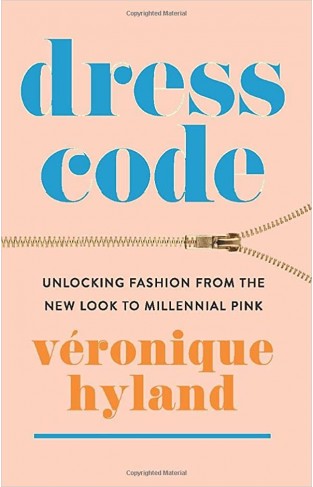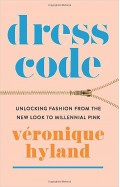- Home
- Books
- Sale
- 11.11 Sale UPTO 90% OFF
- 25% OFF
- Dress Code - Unlocking Fashion from the New Look to Millennial Pink
Dress Code - Unlocking Fashion from the New Look to Millennial Pink
By: Véronique Hyland
-
Rs 1,346.25
- Rs 1,795.00
- 25%
You save Rs 448.75.
Due to constant currency fluctuation, prices are subject to change with or without notice.
A New Yorker Magazine Best Book of 2022 * An Esquire Best Nonfiction Book of 2022 * A Town & Country Must-Read Book of 2022 * A Fashionista Summer Read
“Smart, funny, and impressively thorough.”—The Cut
In the spirit of works by Jia Tolentino and Anne Helen Peterson, a smart and incisive essay collection centered on the fashion industry—its history, its importance, why we wear what we wear, and why it matters—from Elle Magazine’s fashion features director.
Why does fashion hold so much power over us? Most of us care about how we dress and how we present ourselves. Style offers clues about everything from class to which in-group we belong to. Bad Feminist for fashion, Dress Code takes aim at the institutions within the fashion industry while reminding us of the importance of dress and what it means for self-presentation. Everything—from societal changes to the progress (or lack thereof) of women’s rights to the hidden motivations behind what we choose to wear to align ourselves with a particular social group—can be tracked through clothing.
Veronique Hyland examines thought-provoking questions such as: Why has the “French girl” persisted as our most undying archetype? What does “dressing for yourself” really mean for a woman? How should a female politician dress? Will gender-differentiated fashion go forever out of style? How has social media affected and warped our sense of self-presentation, and how are we styling ourselves expressly for it?
Not everyone participates in painting, literature, or film. But there is no “opting out” of fashion. And yet, fashion is still seen as superficial and trivial, and only the finest of couture is considered as art. Hyland argues that fashion is a key that unlocks questions of power, sexuality, and class, taps into history, and sends signals to the world around us. Clothes means something—even if you’re “just” wearing jeans and a T-shirt.
A New Yorker Magazine Best Book of 2022 * An Esquire Best Nonfiction Book of 2022 * A Town & Country Must-Read Book of 2022 * A Fashionista Summer Read
“Smart, funny, and impressively thorough.”—The Cut
In the spirit of works by Jia Tolentino and Anne Helen Peterson, a smart and incisive essay collection centered on the fashion industry—its history, its importance, why we wear what we wear, and why it matters—from Elle Magazine’s fashion features director.
Why does fashion hold so much power over us? Most of us care about how we dress and how we present ourselves. Style offers clues about everything from class to which in-group we belong to. Bad Feminist for fashion, Dress Code takes aim at the institutions within the fashion industry while reminding us of the importance of dress and what it means for self-presentation. Everything—from societal changes to the progress (or lack thereof) of women’s rights to the hidden motivations behind what we choose to wear to align ourselves with a particular social group—can be tracked through clothing.
Veronique Hyland examines thought-provoking questions such as: Why has the “French girl” persisted as our most undying archetype? What does “dressing for yourself” really mean for a woman? How should a female politician dress? Will gender-differentiated fashion go forever out of style? How has social media affected and warped our sense of self-presentation, and how are we styling ourselves expressly for it?
Not everyone participates in painting, literature, or film. But there is no “opting out” of fashion. And yet, fashion is still seen as superficial and trivial, and only the finest of couture is considered as art. Hyland argues that fashion is a key that unlocks questions of power, sexuality, and class, taps into history, and sends signals to the world around us. Clothes means something—even if you’re “just” wearing jeans and a T-shirt.
Dress Code - Unlocking Fashion from the New Look to Millennial Pink
By: Véronique Hyland
Rs 1,346.25 Rs 1,795.00 Ex Tax :Rs 1,346.25
Zubin Mehta: A Musical Journey (An Authorized Biography)
By: VOID - Bakhtiar K. Dadabhoy
Rs 472.50 Rs 1,050.00 Ex Tax :Rs 472.50
Myths Illusions and Peace: Finding a New Direction for America in the Middle East
By: Dennis Ross
Rs 876.00 Rs 1,095.00 Ex Tax :Rs 876.00
The Origins of Political Order From Prehuman Times to the French RevolutioN
By: Francis Fukuyama
Rs 3,116.00 Rs 3,895.00 Ex Tax :Rs 3,116.00
Manning Up: How the Rise of Women Has Turned Men into Boys
By: Kay Hymowitz
Rs 646.75 Rs 995.00 Ex Tax :Rs 646.75
The Obama Syndrome: Surrender At Home War Abroad
By: Tariq Ali
Rs 1,036.00 Rs 1,295.00 Ex Tax :Rs 1,036.00
The Quest For Meaning: Developing A Philosophy Of Pluralism
By: Tariq Ramadan
Rs 1,116.00 Rs 1,395.00 Ex Tax :Rs 1,116.00
No similar books from this author available at the moment.
No recently viewed books available at the moment.
Zubin Mehta: A Musical Journey (An Authorized Biography)
By: VOID - Bakhtiar K. Dadabhoy
Rs 472.50 Rs 1,050.00 Ex Tax :Rs 472.50
Dress Code - Unlocking Fashion from the New Look to Millennial Pink
By: Véronique Hyland
Rs 1,346.25 Rs 1,795.00 Ex Tax :Rs 1,346.25













-120x187.jpg?q6)







-120x187.jpg?q6)





